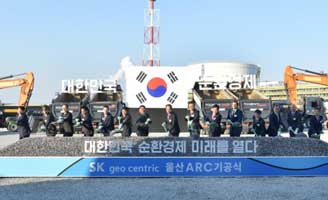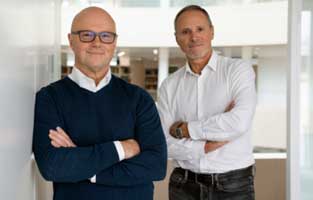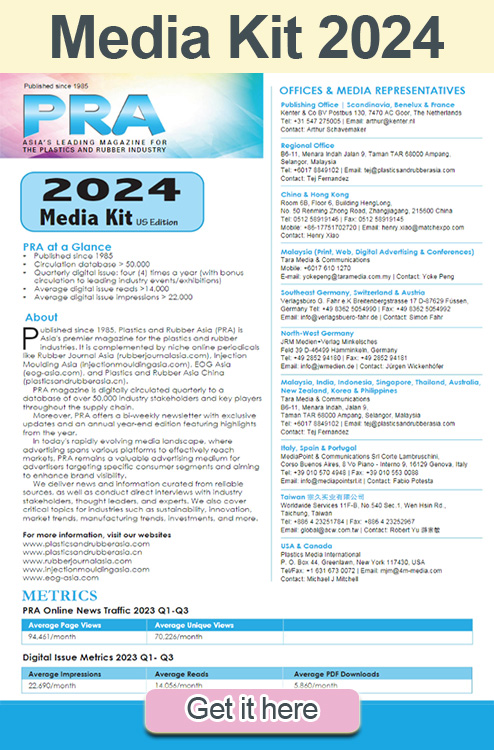Green news: SK Geo breaks ground on US$1 bn recycling complex in South Korea; Technip Energies creates Reju to commercialise IBM’s polyester recycling tech

South Korean conglomerate SK Geo Centric, formerly SK Global, says it has started construction on a recycling centre in Ulsan, South Korea, in the refining and petrochemical complex of its parent, SK Innovation Co. in the coastal city 400 km southeast of Seoul. The firm says the planned Ulsan Advanced Recycling Cluster (ARC) is “the world’s first plastic recycling complex of its kind.” The company could invest as much as US$1.4 billion in a campus that will be 215,000 sq m in size.
Ulsan ARC, which is scheduled for completion by the end of 2025, will apply three chemical, or advanced, recycling technologies in one site, says SK Geo Centric. The firm is partnering with US-based PureCycle Technologies, Canada-based Loop Industries and UK-based Plastic Energy on the technology front.
SKGC says once the Ulsan ARC starts operating, 320,000 tonnes/year of plastic scrap can be turned into new resources. “In terms of scale, the mass of the plastic in the Great Pacific Garbage Patch was estimated to be approximately 80,000 metric tonnes, and that amount can be processed in three months through ARC facilities,” according to the company.
SKGC says it intentionally decided that Ulsan ARC will implement three different chemical recycling technologies at the site: pyrolysis, high purity polypropylene (PP) extraction and depolymerisation.
“The site will be able to create raw plastic materials from a wide range of discarded plastics, such as take-out containers, bottles, automotive parts and certain plastic-based textiles. It will even be able to turn some plastics, such as vinyl and other composite plastics, into chemical materials that can be used as a substitute for crude oil," the company says.
It aims to sell 70% of its output from the cluster even before construction is completed. It plans to leave the rest for sales later, amid expectations that product prices will rise higher, even though it could sign supply deals for all of its production.
Plastic Energy’s chemical recycling technology is among the most established in the world, with the firm operating recycling plants in Spain since 2016. Plastic Energy also works in tandem with global petrochemical partners, including TotalEnergies, ExxonMobil and Sabic.
SKGC is also in talks with waste plastic recycling plants in Europe, Asia and China relating to its operational experience at the Ulsan ARC. The company aims to invest EUR450 million with two French companies to build a plant with a 70,000 tonnes/year capacity by 2027.

In other news, building on its technology partnership with IBM and Under Armour, technology firm Technip Energies announces the launch of Reju, a new company focused on PET (Polyethylene terephthalate) recycling (rPET) of textiles that will leverage the technology co-developed in joint-venture with IBM and Under Armour as well as Technip Energies’ global engineering and technology integration expertise.
Reju will address the fast-growing market of global rPET whose demand from the textile market is expected to grow up to 20 million tonnes/year by 2033, driven by industry pledges and targets on recycling, regulation and consumer awareness of the need to reduce plastic waste.
Technip Energies, IBM and Under Armour have been working together since 2021 in a joint venture to bring VolCat, an IBM technology for rejuvenating waste PET packaging and polyester, to an industrial scale. VolCat allows the selective breakdown of polymers which IBM first applied to technologies like semiconductor lithography and microelectronics packaging. Reju intends to use this technology to address hard-to-recycle polyester garments and PET packaging lost to the waste stream today. With this technology, acting as a molecular sorter, PET could be regenerated infinitely.
The groundbreaking ceremony for Reju’s demonstration plant took place in September in Technip Energies Frankfurt Research Centre with the facility expected to come on stream in 2024.
Arnaud Pieton, CEO of Technip Energies, commented: “Globally, less than 1% of PET textiles waste is recycled today. This means that most textiles end up as waste in landfills when they could be repeatedly reused in new clothes. What has been holding the world back in textile circularity is not a lack of demand for textile recycling but the lack of a solution that makes recycling of textiles economical on an industrial scale. For the first time in this domain, a unique scalable technology is directly associated with a scalability expert like Technip Energies. Reju will deliver the promise of economical textile recycling, and we are proud to extend our role as an active agent of circularity.”
Arvind Krishna, CEO of IBM, said: “The health of our planet has never been more pressing, and the amount of fashion apparel and textiles that end up in landfills today is enormous. The good news is that technology can help solve this challenge. IBM is proud to provide its VolCat technology to support Reju in advancing sustainable textile recycling. We look forward to collaborating with Technip Energies and Reju to champion initiatives like these that place sustainability at the heart of the global textile industry.”
Former Under Armour CEO and apparel industry veteran Patrik Frisk is heading the new company along with Alain Poincheval, COO, a senior executive with Technip Energies.
(PRA)
Subscribe to Get the Latest Updates from PRA Please click here
©2023 Plastics and Rubber Asia. All rights reserved.

©2023 Plastics and Rubber Asia. All rights reserved.
Home Terms & Conditions Privacy Policy Webmail Site Map About Us















